Young Scholars Program Exposes Local High School Students to Research, the University
August 2, 2017
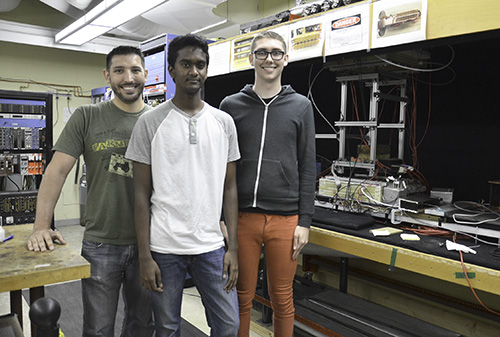
Physics Young Scholar Sibiraj Senguttuvan (center) in the Perdekamp lab with his mentors, physics grad students Chad Lantz and Joseph Bryant. (Image courtesy of Siv Schwink.)
Instead of spending their summers working at McDonalds, or lounging by the pool, twelve rising juniors and seniors from Centennial and Central High Schools in Champaign spent the summer learning about things like photon quantum mechanics, dark matter detectors, and the biochemistry of swimming bacteria. Part of the Young Scholars Program, a new, six-week summer research opportunity, the students got to experience authentic, cutting-edge research in some of Illinois' premier research labs. Begun by the Nuclear Physics Laboratory in the Physics Department, who joined forces with the POETS Engineering Research Center to broaden and strengthen the program, Young Scholars received funding from multiple sources: ICR funds from the NSF NPL grant, the NSF-funded POETS, the Physics Department itself, and the College of Engineering (which provided funding for one student). The fledgling program was begun to help students discover what research is actually like, determine if research might be in their futures, plus give them an idea of what college is like.
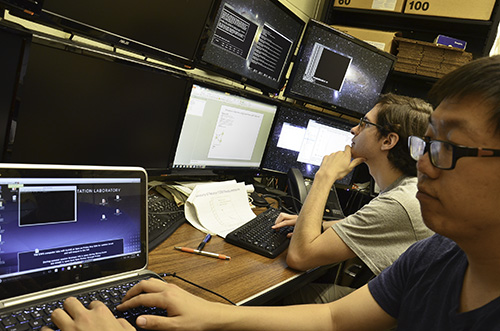
Physics Young Scholar Gus Soares (right) working side by side with his mentor, Pan Ji (in the foreground) in the Yang lab. (Image courtesy of Siv Schwink.)
From June 19th–July 28th this summer, the twelve scholars worked from 9–5 every day in campus research labs, receiving a $2000 stipend. Since the program was not residential, students lived at home, but received MTD passes to facilitate transportation. And to give them a taste of what life on campus is like, lunch was provided for both the high school students and their mentors at the Illinois Street Residence Halls.
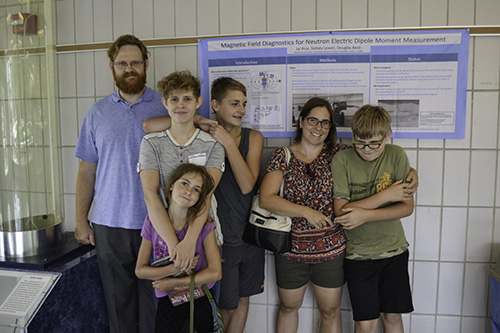
Jai Rice (second from the left) with his family at the poster session.
According to Jessica Perez, POETS’ Associate Director of Education and Inclusivity, the Young Scholars Program recruited minority students, with a preference for first-generation students (their parents hadn't gone to college). Of the twelve participants, half were young women (generally underrepresented in STEM fields). While the ethnicity of participants is protected by FERPA, Douglas Beck, a Physics Professor and a Young Scholars co-director along with Perez, stresses that “drawing from underrepresented groups is a key element of the program.”
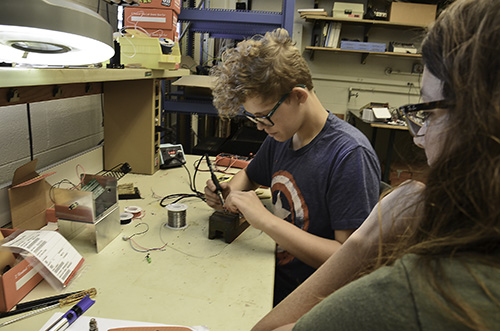
Jai Rice (left) at work in his lab with his mentor, Sidney Lower. (Image courtesy of Siv Schwink.)
According to Beck, the program was begun in response to the April 22nd March for Science, during which more than one million people in more than 600 cities around the world “marched” as part of a “grassroots effort to champion science as a pillar of human freedom and prosperity.”
“We were trying to think of something that we could do locally that would be more than just having a statement on one day,” Beck explains. “And we thought that bringing high school students into our labs to show them a little bit about how science was done would be a good thing. And so that was the way the program started.”
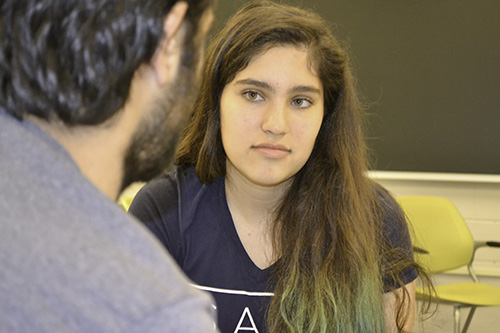
Physics Young Scholar Luciana Toledo-Lopez.
Beck says the goal of Young Scholars was to “provide a program for those young people in our own community who might not have the opportunity to participate in STEM careers, or just to experience cutting-edge science in person.” Beck's one-sentence goal was to “better appreciate how we ask and answer questions in science.”
The program also sought to “help the students to be comfortable in a campus setting,” Beck adds, “to encourage them to take advantage of higher education.” Perez agrees, adding that, initially, “We just wanted to get students in the lab, and we wanted them to feel comfortable at a university and to make them feel like this is a place they could call their own. So we were really focused on making them feel comfortable and less so about how productive their research experience was.”
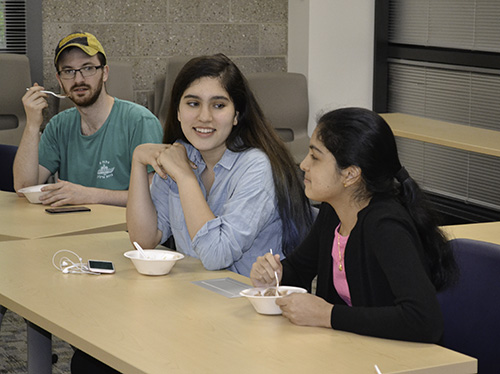
Physics Young Scholar Luciana Toledo-Lopez (center) and Neha Hebbar (right) enjoying ice cream and a chat at the Ice Cream Social.
However, as the planning progressed, the directors more fully developed the support system in regards to the research. Each student had an undergrad, grad student, or post-doc research mentor, in addition to the researcher in whose lab they were working. However, concerns arose that the scholars might feel uncomfortable asking questions of their mentors (who would be older and an authority figure), or that their mentors might not know how best help the high schoolers adapt to working in labs. So planners decided to pair students with persons with whom they already felt comfortable—teachers from their own high schools. So every week, students met with Centennial’s Jill McLean and Central’s Darren Plattner, who helped coach them regarding how to navigate a lab and ask questions.
“It also is another point of entry where if the student doesn't feel comfortable talking to us or the graduate students or the post-docs,” Perez explains, “they have someone that they know, that they can voice some of their concerns with.”
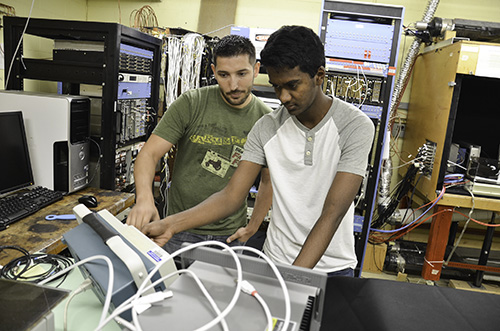
Chad Lantz and Young Scholar Sibiraj Senguttuvan (right) do a procedure in the Grosse Perdekamp lab. (Image courtesy of Siv Schwink.)
Perez continues, “Because the emphasis is making them comfortable in the university environment, we're hoping that that structure will help get us closer to that goal, because we'll be able to catch if there are any issues along the way.”
Scholars also attended research talks, workshops, and training sessions. For example, they learned about the college application process and how to present their research, such as via a poster.
In addition, both the scholars and their mentors received training from IRISE (the Illinois partnership for Respecting the Identities of Students in Engineering). IRISE Associate Director Sharlene Denos and other IRISE staff led the mentor/mentee training effort by organizing three workshops for the graduate student mentors and their young mentees, which took place over the duration of the program. IRISE's goal was to train the mentors in best practices in mentoring and to help them develop mentor action plans to most effectively support their young mentees, based on the mentees' specific interests and goals. Workshops for the young scholars helped them communicate their goals to their mentors so they could get the most out of their experience. “I also tried to remain in touch with the mentors and organizers as the program progressed,” says Denos, “providing advice where possible to improve the experience for mentors and mentees.”
To give participants a chance to interact with some of the other program participants outside of the lab, several social activities were scheduled. For instance, an ice cream social, in addition to providing a tasty snack to tide participants over until dinner, gave the students a chance to not only get to know their fellow scholars better, but other university folk participating in the program.
Students also gained another skill—making and presenting a poster at a research symposium held on Friday, July 28th—to which students, mentors, teachers, and parents were invited.
However, the main take-away the scholars gained from the program was the research, which was why they wanted to be involved.
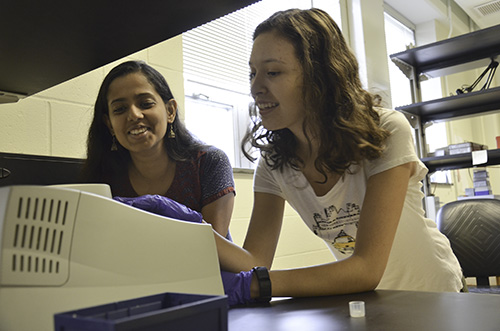
Grad student mentor Roshni Bano and Physics Young Scholar Clara Duarte (right) do a procedure in Physics Professor Yann Chemla's lab. (Image courtesy of Siv Schwink.)
For instance, Clara Duarte, in a thank-you note to Douglas Beck following the experience, shares, "I just wanted to thank you for the fabulous experience that this Young Scholars program has been. It has definitely made me want to seriously consider physics as a field of study. Everyone in the program was very kind and helpful in teaching me all I needed to learn. After having such a great experience, it will be hard to return to high school, which isn't half as fun. I'm really going to treasure this experience."
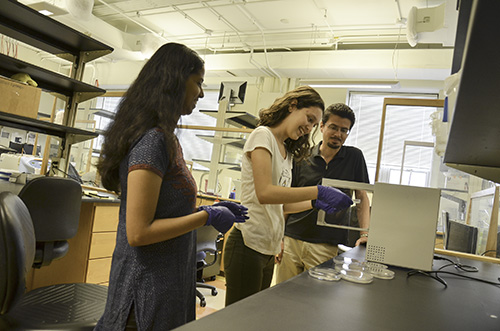
Left to right: Grad student mentor Roshni Bano, Clara Duarte, and Yann Chemla watch as Clara does a procedure in Physics Professor Yann Chemla's lab. (Image courtesy of Siv Schwink.)
Professor Yann Chemla shares some of the benefits he sees for the students involved, including his own grad students: “Mentoring a high school student is a lot of work, but it is very important and hugely rewarding for all parties involved. Understanding what working in a lab is like, and how different it is from learning science in a classroom, is enormously beneficial to a student, even if they don’t end up pursuing a career in science.”
“Also," he adds, "mentoring junior students is a great experience for my lab members. Teaching someone how to do an experiment helps a graduate student learn ways to communicate complex tasks effectively and also forces them to think about the reasons why we do experiments in a particular way. I think mentoring experience is invaluable; it helps graduate students become better scientists.”
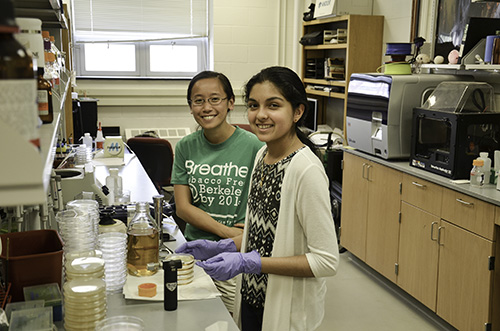
Physics Young Scholar Neha Hebbar (right) and her grad student mentor, Gloria Lee. (Image courtesy of Siv Schwink.)
For instance, Physics Scholar Neha Hebbar, a rising junior at Central High School, shares:
“I wanted some research experience, because I’ve never done research before, and I’ve never really been in a professional lab, so I just wanted to see how that goes.”
So how did it go? “I really like working in the lab and having some tasks to do," she reports. "I never had this experience before. I’m thankful I got to do it so early. My favorite part of the experience is the hands-on lab work. We’re working on transposable elements called ‘jumping genes."
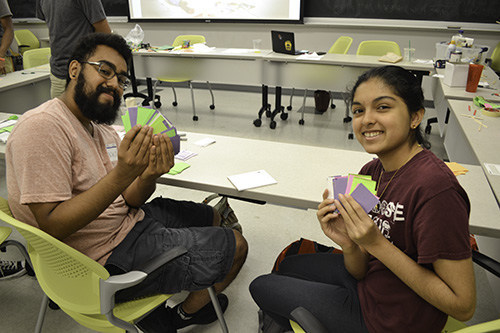
During the iRISE training by Sharlene Denos, Neha Hebbar (right) and her undergraduate mentor, Niko Urriola, show an outreach activity they made, a card game that's related to their research.
Working in Physics Assistant Professor Tom Kuhlman’s Lab, Hebbar admits that while they didn't make any major discoveries during her time there, “We’re getting there. We’re doing small steps. We’re trying to image the jumping genes using fluorescence.” Working with her mentor, grad student Gloria Lee, Hebbar says they were “trying to improve her technique of finding where it is. So we’re getting there.”
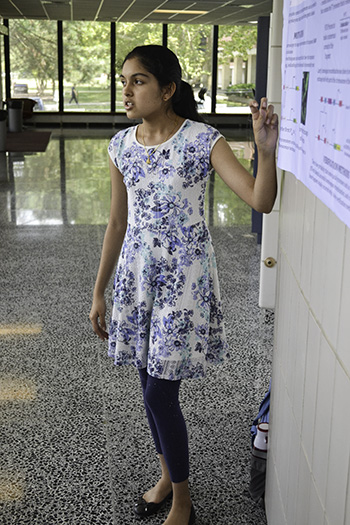
Physics Young Scholar Neha Hebbar presenting her research at the poster sesssion.
Hebbar has also discovered that she likes research, and it’s something she might consider down the road. “I’m thinking neuroscience,” she says, “but physics may be an option.”
According to Gloria Lee, “Neha seems to have a real interest in science, so I think getting research experience this early has been beneficial to her. She can see what it's like to work on a real science problem, successes, setbacks, and all, as well as develop some practical lab skills.”
Lee also reports that Hebbar has been an asset to the lab. “As an experimental biophysics lab, we carry out procedures that are very hands-on and can be learned fairly easily. I show Neha how to do an experiment and then have her carry it out, so a lot of the progress on my project actually has been made by her.”
Hebbar’s other mentor, undergraduate senior Niko Urriola, explains why he decided to be a mentor this summer. “I thought it would be a good way for me to not only show someone else what I’ve learned while researching, but also get them to show me a few things about teaching young students, and that’s something that I really enjoy.” Urriola indicates that he’s learned a lot about teaching from Neha, grad student Gloria Lee, as well as from researcher Tom Kuhlman.
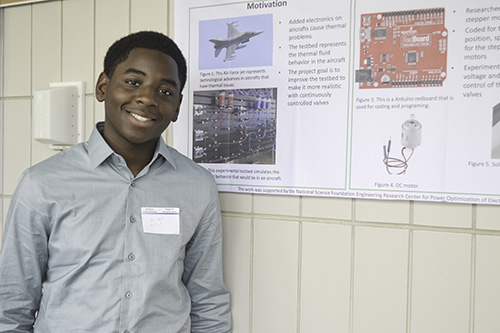
POETS Young Scholar Darius Jackson at the Young Scholars Poster Session.
POETS Young Scholar, Darius Jackson, a rising junior from Centennial, explains why he joined the program. “I really like Physics and making things,” he says, “and then my teacher told me about it because I didn't get into two other Physics programs. So this was really good for me.”
Jackson, who hasn’t taken Physics yet, thinks his participation is going to give him a jump start when he takes it this fall.
His research in Professor Andrew Alleyne’s lab involves valves and motors. Jackson, who didn’t really know anything about valves and motors before this experience, reports that valves either have an off and on button, but can't really go half way or 25% of the way. So in his lab, they’re trying to do give the researcher control over how they operate.
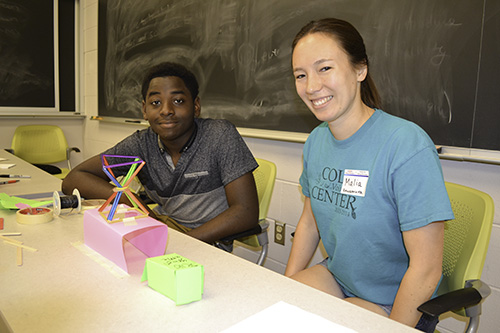
Darius Jackson and his mentor, Malia Kawamura, show the hands-on outreach project they designed at the iRISE training session.
Jackson indicates that he likes research,says, “It's definitely different from high school,” but that it’s something that he might want to do down the road.
His mentor, Malia Kawamura, who just graduated with a Master's degree in May in Mechanical Engineering, says she agreed to be a mentor because she had been a mentor last semester and really enjoyed it.
“I was like ‘That sounds fun. That sounds like something I would enjoy doing because I loved working with the [POETS] program and so I knew that the program was great and knew anyone coming out of that would be great to work with.’” She reports that she thought he would fit in well into their lab group, “And he really has.”
Kawalura, who’s working with a thermal fluid experiment that needs valves, reports that Jackson is contributing to the larger project by looking at a few different types of valves. “We've been needing to learn more about how valves work, and how to control them, and so that's where he's really contributing to our lab with that effort. So it's been very direct for how that's going to help in our group.”
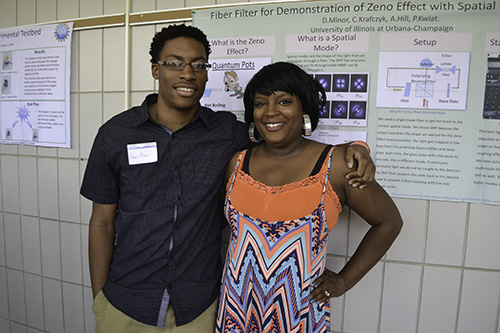
Physics Young Scholar Davan Minor poses with his mom at the final poster session.
Davan Minor. Physics Scholar Davan Minor, a rising senior from Centennial High School, participated in the program because he wanted to “learn more about physics, and get some experience." He indicates that his favorite thing was: “getting hands-on experience in a lab and getting to work with lasers.”
Minor, who is researching photon quantum mechanics in researcher Paul Kwiat’s lab, reports that he likes the research. “It is pretty interesting, and there are really a lot of details to the research, so you have to be careful and pay attention when you’re working.”
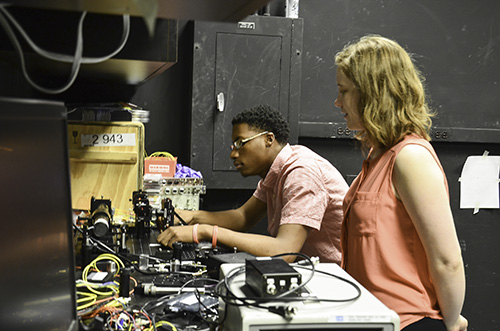
Davan Minor, and his mentor, Courtney Krafczyk, at work in their lab. (Image courtesy of Siv Schwink.)
Minor, who was excited by the opportunity to learn more about physics, compares what he did in the lab to high school, “Here you actually get to see how it works, instead of just doing formulas.”
Minor thinks physics is something he might be interested in doing down the road. His career goal is to "be an engineer, working with robotics.”
He also feels his research experience is also helping him as a student: “I think it gave me a head start on stuff that I may be learning in the future, like in class, or things I may be dealing with.”
Minor’s mentor, Courtney Krafczyk, a sixth year PhD student in Physics, shares why she signed up to be a mentor.
“I just like mentoring people," she explains. "I find it rewarding, and I think it’s important to help the next generation come up and help shape the field. And also, I am considering maybe being teacher after I graduate with my PhD, so it’s a good experience for me.”
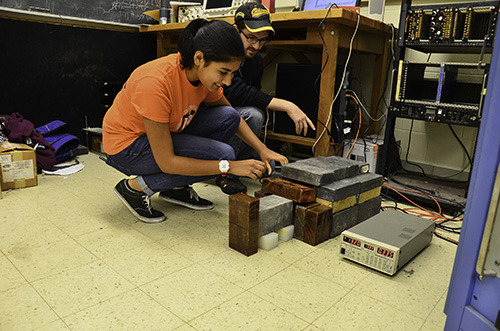
Physics Young Scholar Ritu Dave and her grad student mentor, Raanan Gluck, at work in their lab. (Image courtesy of Siv Schwink.)
Physics Young Scholar Ritu Dave, a rising junior at Centennial High, worked in the Yang lab, with mentor Raanan Gluck, researching dark matter detectors.
“The radioactive sources we put in go through the crystal," Dave explains, "then light comes out and we measure it. We’re using this to calibrate our detector, so that it can be used to look at dark matter particles.”
What did she learn this summer about research? “Lab work comes with a lot of setbacks and things that don’t go right that you need to fix." she admits. "You need to learn to fix problems and work around the setbacks to get answers. So, one thing I learned is that research answers don’t come quickly.”
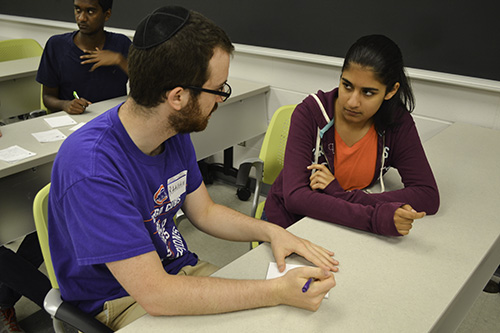
Raanan Gluck and Ritu Dave interact during the iRISE training session.
She also acknowledges that her experience was signficantly different from learning in the classroom: “This is way more hands-on than school. We get to look at our data and decide what to do next. There are no next steps laid out for us—we have to kind of guide the experiment.”
Dave hasn't yet firmed up her career goals: “I was very interested in medicine," she admits, "but now that I have studied some chemistry and physics and been exposed to this experiment, these subjects have grown on me. I might pursue physics, maybe a little more on the side of engineering, where there is more problem solving. I’d like to go into scientific research.”
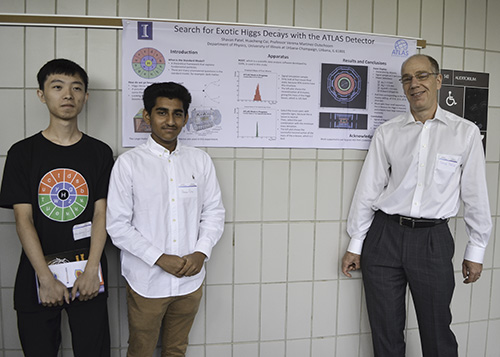
Graduate student mentor Huacheng Cai, Physics Young Scholar Shavon Patel, and Doug Beck by Patel’s poster at the Young Scholars Poster Session.
Beck's assessment of the program's impact was similar to many of the students' comments:
“I think that lots of the students were surprised, maybe, by the range of things that are being done at the university," Beck explains." I think that they’re surprised, maybe, by the amount of painstaking and sometimes tedious work that’s involved in doing science. So a whole range of experiences. I think that they’ve learned something about working in big groups—very often the labs involve lots of people. So, all kinds of lessons that, I think, are transferrable to whatever they decide to do in their future.”
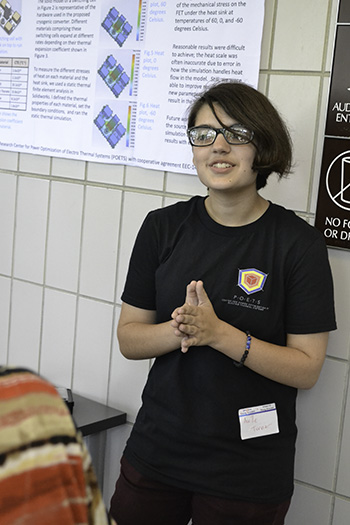
POETS Young Scholar Avrille Turner presents her reserach during the poster session.
Douglas Beck expressed appreciation to the other principles, Jessica Perez, and Sharlene Denos, plus many others who helped to make the program a success, including Joe Muskin from POETS/MechSE, Centennial teacher Lindsay Aikman, Erika Olivares and Karissa McDermott at the Unit 4 district office, and Beck indicates they received “lots of critical support” from Physics Business Manager, Mike Suchor. In addition, I-STEM provided evaluation support and publicity.
Story by Elizabeth Innes, Communications Specialist, I-STEM Education Initiative, with Siv Schwink, Communications Coordinator, Department of Physics. Photographs by Elizabeth Innes and Siv Schwink.
More: 8-12 STEM Outreach, Centennial, Central, Funded, High School Research, iRise, Physics, POETS, REU, Summer Research, Underserved/Underrepresented Minorities, 2017
For more I-STEM articles about Physics and POETS, see:
- Physics Van: A Whole Lot of Fun… Plus, You Get to Blow Stuff Up
- Mats Selen–Changing the Way Physics is Taught
- POETS Seminar, ENVISION, Seek to Get Grad Students Hooked on Outreach
- POETS, New NSF Center at Illinois Poised to Revolutionize Electro-Thermal Systems
- POETS Seeks to Change the Attitudes, Shape of Students in STEM Pipeline
- POETS REU Helps Illinois Undergrad Sabrina Yin Choose Her Career Path
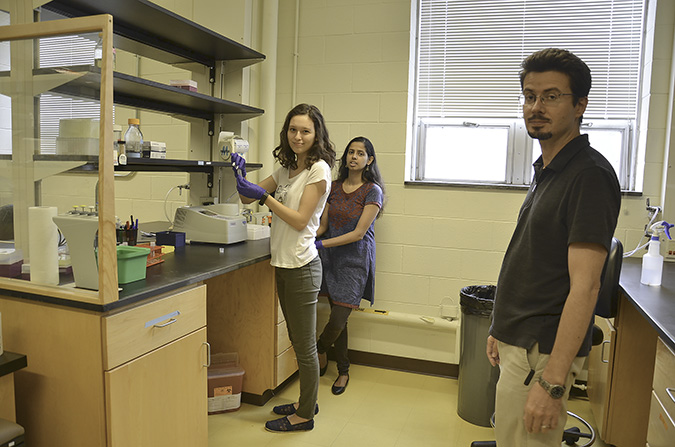
Left to right: Clara Duarte, with grad student mentor Roshni Bano and researcher Yann Chemla. (Image courtesy of Siv Schwink.)













.jpg)
















